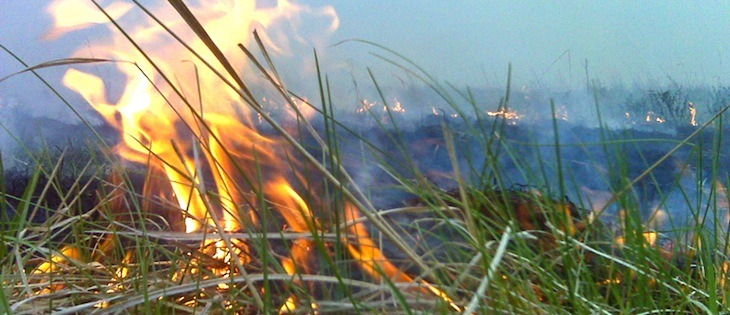Arkansas Department of Agriculture promotes best burning practices for row crop fields
by October 13, 2021 7:36 am 894 views

An annual, artificial haze is set to descend in the skies of the Arkansas Delta as the harvest makes way for the burning of row crop fields. The Arkansas Department of Agriculture wants to remind its partners in agriculture and conservation of the importance of safe, prescribed burning techniques as a valuable tool in crop management plans.
Row crop farmers use prescribed fires in the fall as part of crop management plans to remove stubble following the harvest of rice, soybeans, corn, and cotton. Prescribed burning is an efficient and economical control method for preparing fields for the next growing season and eliminating pests and diseases. Burning crop residue also allows for no-till or reduced-till planting during the next growing season. Smoke management planning prior to the application of prescribed fires helps to reduce smoke impact on roadways, nearby towns, and sensitive areas like schools, nursing homes, churches, and other facilities.
Opponents of the practice argue it causes air pollution and several doctors have expressed worries about how the smoke can impact lung health. Blazing fields, at times, produce plumes of smoke that can cover roadways and create potential driving hazards.
“We want to remind all farmers who are using prescribed burns to make a safe smoke management plan, so we can continue to be good neighbors to all Arkansans,” said Arkansas Secretary of Agriculture Wes Ward.
Farmers can report a prescribed fire here. There is a Safe Burning Checklist which farmers complete before applying prescribed fire:
· Take extra precautions for smoke sensitive areas (highways, residents, communities, etc.)
· Report prescribed burns to the Arkansas Department of Agriculture’s Dispatch Center (1-800-830-8015)
· Check to make sure relative humidity is above 20%
· Check to make sure wind speed is less than 15 mph
· Be sure to follow appropriate Smoke Category Day guidelines
Reporting the burn to the Arkansas Department of Agriculture’s Dispatch Center provides a full understanding to the farmer of weather conditions, information about other burns in the area, and proximity of nearby smoke sensitive areas like schools, nursing homes, and highways.
“It is crucial for farmers to practice the responsible stewardship of our resources and avoid future regulations and red tape for our producers. Prescribed fire is a valuable tool and calling the hotline before burning takes only seconds. Taking these proactive measures today will help us ensure a quality air shed for our families and communities for generations to come,” said David Gairhan, Arkansas Rice Federation Chairman.
